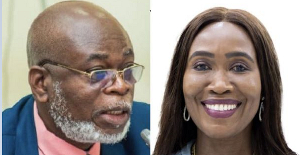I am a Ghanaian public interest journalist who has keenly followed and written consistently on issues surrounding the questionable award of an Integrated Tax Administration System (ITAS) contract by the Ghana Revenue Authority (GRA) for domestic revenue mobilization in Ghana to an Indian company.
On Monday, July 29, 2024, when the Commissioner General of GRA, Julie Essiam, appeared before the Public Accounts Committee (PAC) of Parliament, of which you are the honourable chair, she was questioned about that contract by Mr. Kofi Adams. Her responses were a mixed bag of truths, half-truths, and untruths.
Mr. Chairman, you know more than I do that Parliament is a house of records, so it is important that any information provided to Parliament regarding how this country is being run be the truth and nothing else but the truth. Besides, anyone who appears before Parliament to provide any information does so under oath. So, the person is both legally and morally required to tell the truth.
I would therefore like to crave your indulgence as a Ghanaian to look further into the processes that led to Julie Essiam signing away Ghana’s domestic tax mobilization to an Indian company in light of the responses she gave under oath before your honourable committee.
Sir, permit me to go straight to the point by stating some of Julie Essiam’s responses vis-à-vis what I know as a journalist, just to give you some pointers for your own further investigations.
Julie Essiam finally admitted that she handpicked Tata Consultancy Services (TCS) from India and signed the ITAS contract with them after the former Commissioner General had cancelled the process on January 3, 2024. She said the contract was imperative because it was part of IMF conditionalities.
Mr. Chairman this requires some probing as to whether the IMF conditionalities specifically said the current locally-made ITAS solution being used for domestic revenue mobilization, the Ghana Integrated Tax Management and Information Systems (GITMIS) should be scrapped and replaced.
What exactly did IMF say about GITMIS and the e-VAT solutions being used currently? It will be of great service to Ghana if you went beyond what Julie Essiam said and looked deeper into IMF’s position on GITMIS and e-VAT.
In fact, I am reliably informed that experts from IMF and the World Bank toured GRA and the offices of the local developers of GITMIS, Axon Information Systems, and they were impressed with what they saw. I have not seen any document in which they called for a replacement of GITMIS. I believe you are in a better position to use your office to look into this for clarity.
Julie Essiam also said under oath that the reason she handpicked TCS from India for the job was because TCS presented the lowest contract cost of $29 million when TCS was in partnership with an Indian-owned Ghana-based IT company, IPMC. Then, after decoupling TCS from IPMC, she was able to beat the price down to $25 million.
Closely related to that claim, she also said under oath that the current solutions provider, Axon Information Systems, who developed the GITMIS, came fourth in the bidding process.
Sir, here is a pointer you can use to probe these claims by Julie Essiam.
Firstly, As Julie Essiam stated to the PAC, the first review of 12 bids was done by an in-house technical committee at GRA, and they selected only TCS/IPMC at the time. Not satisfied by the turn of events, the former Commissioner General, Rev. Dr. Amishaddai Owusu Amoah, employed the services of KPMG to look at all 12 bids again. KPMG eventually selected three qualifying candidates: TCS/IPMC, Axon, as well as Atos and Persol.
Each of the three scored over 80% for their technical proposals, which qualified all three of them for the financial proposal stage. Per KPMG’s report, out of the three candidates, TCS/IPMC had the highest cost of $69 million, followed by Atos and Persol with $61 million, and then Axon with $41 million.
KPMG therefore gave Axon a full 20 marks as the best bid based on the financial proposal. In other words, Axon came in first per the KPMG report and not fourth, as Julie Essiam said under oath. There is no known document that states that Axon emerged as fourth in any bidding process by the GRA. It will only be fair for you to give Julie Essiam the opportunity to provide evidence to back what she said under oath.
Again, contrary to what Julie Essiam said, out of the three, TCS/IPMC actually came in last with a 12.05 score because they had the highest cost of $69 million, and Atos and Persol came in second with 13.76. So, Julie Essiam’s claim that TCS/IPMC came first needs to be probed, and her claim that their initial bid price was $29 million is also not true, unless Julie Essiam is quoting from a document
that is only known to her and not to all the other stakeholders in this process. This is something you might want to look into, sir.
Julie Essiam also claimed that TCS has rolled out their ITAS system in some African countries, and that was why they were handpicked for the job after the former CG had done due diligence on them by visiting India and the other African countries to see their work.
Mr. Chairman you need to probe this claim further because the former CG and his team did find that the TCS solution deployed in other countries had grave challenges for which they had either been kicked out or about to be kicked out at the time of their visit. I am aware of deployments in Rwanda, Kenya, Uganda and Zambia. Of all these four places. TCS has been kicked out for various reasons.
It will do Ghana a great service if your honourable committee can look further into that and why Julie Essiam is bent on having such a problematic solution deployed for domestic tax mobilization in Ghana.
As you are aware, Mr. Chairman, TCS is an Indian company. Even in their own home country, India, their solution is not the one being used for domestic tax mobilization. Should that not be of concern to Ghana?
Again, just in June this year, a court of competent jurisdiction in the United States of America found TCS guilty of misappropriating another company’s trade secrets. This should also be of concern to Ghana. Why would we hand over our domestic tax mobilization and critical citizen data to a company with such a record?
Sir, please take note that Julie Essiam said that our Ghana Card numbers are now our TIN (tax identification numbers). This was because GITMIS and others have integrated with the National Identification Authority (NIA) database. Imagine if all this data is handed over to an Indian company with a questionable character like what we know of TCS?!
Contract signed without Board approval:
Mr. Chairman, another very worrying development is that Julie Essiam actually signed this very important contract with TCS without the approval of the GRA board. At the time, she rushed to sign the deal, just two months after her appointment, the new board of the GRA had not even had their first meeting. In the absence of the board, it was illegal for her to have signed that contract without Parliamentary approval.
This is something you might want to look into, Sir. Julie Essiam also claimed she had approvals from the Public Procurement Authority (PPA) and the
Ministry of Finance to sign the sole source TCS. You might want to look into that to confirm the veracity of that claim. My understanding is that by law, once the process was truncated, it had to start all over again with a fair chance for all other candidates to put in their bids.
But Julie Essiam handpicked the candidate who emerged the worst of the top three and willed our domestic tax mobilization to them. Please, look into it.
Mr. Chairman, are you also aware that the contract Julie Essiam has awarded to TCS of India is supposed to take off in 2026, when this current administration would have gone out of power and Julie Essiam herself may not be in office as Commissioner-General? The begging question is, why the rush to award a contract to a foreign entity which can only start in the next two years?
Meanwhile, there is a very competent vendor at the post right now. This is something you should probe, sir. You may find that Julie Essiam is probably being sponsored by some political actors to burden another administration or government with this potential illegality.
Another issue that should be of interest to your honourable committee is a claim by former GRA Board Chair, Prof. Stephen Adei, that way back in April 2021, Julie Essiam was due for retirement. So, the claim that she was appointed as CG in 2024 at age 61 could be questionable. It will be important for you to confirm that for Ghanaians, as a house of records.
What GITMIS has done for Ghana:
Mr. Chairman, at this juncture, it is important to spell out some of the achievements of GRA since the deployment of GITMIS. It is very common to find that when GRA rolls out a particular solution for the purposes of revenue mobilization, they always try to convince the public that they are right
in spending public funds on that solution by telling us how that solution has helped boost revenue mobilization.
GRA has, for instance, never stopped lauding ICUMS for boosting revenue mobilization at our seaports and airports. Even though SML has been found to be scandalous and of no value to us, GRA went to their defence to try and convince us that SML was heaven-sent.
GITMIS is the locally-made solution that GRA has used to collect over 72% of tax revenues in this country for at least four years. Yet when asked why GRA would not maintain GITMIS and improve on it instead of handing over domestic tax mobilization to an Indian company, Julie Essiam said all the achievements in domestic revenue mobilization was through the hard work of GRA staff and not due
to the effectiveness of GITMIS.
Mr. Chairman, you need to probe that claim by Julie Essiam further.
If all the achievements in domestic revenue collection are by the staff of GRA, then why would Julie Essiam not spend less than $25 million to give the staff salary increases to continue their hard work instead of signing away the job to an Indian company with a problematic solution?
You need to speak with GRA workers and clients and let them share their own testimonies about the effectiveness or otherwise of GITMIS.
For starters, here are some numbers in terms of what GRA has achieved since the deployment of GITMIS over the last four years.
2020: total tax was GHS45.4 billion, out of which GITMIS collected GHS32 billion (70.5%).
The target was exceeded by over GHS2.6 billion.
2021: total tax was GHS57.43 billion, out of which GITMIS mobilized GHS38.1 billion (66.3%). The target exceeded by over GHS370 million
2022: total tax was GHS75.54, out of which GITMIS collected GHS50.7 billion (67%). The target was exceeded by a significant GHS 3.6 million.
2023: GHS113.06 billion, out of which GITMIS was responsible for GHS82.6 million (73%).
Then, in mid-year 2024, the first COVID-free election year that GITMIS is in charge of, GRA reported a mid-year revenue mobilization of GHS68.049 billion, against a mid-year target of GHS67.9 billion.
This means, for the first time in the history of an election year in Ghana, GRA has exceeded its mid- year revenue target by GHS138.6 million. This has never happened before. And it is obvious from the last four years that GITMIS has been the main tool, collecting between 66.3% and 73% of the total tax revenue.
So, it goes without saying that GITMIS is largely responsible for the historic feat of domestic revenue mobilization this election year.
Mr. Chairman, it would appear that people like Julie Essiam have elected to be on the side of history that peddles half-truths and untruths, sells Ghana for a song to problematic foreign companies, and shortchanges very competent local companies in the process. It is my firm belief that you and your honourable colleagues on the Parliamentary Public Accounts Committee will choose the side of history that insists on the truth and empowers competent local companies.
More importantly, you will choose the side of history that protects critical national data from getting into the hands of an Indian company with questionable character.
Opinions of Wednesday, 7 August 2024
Columnist: Samuel Dowuona















